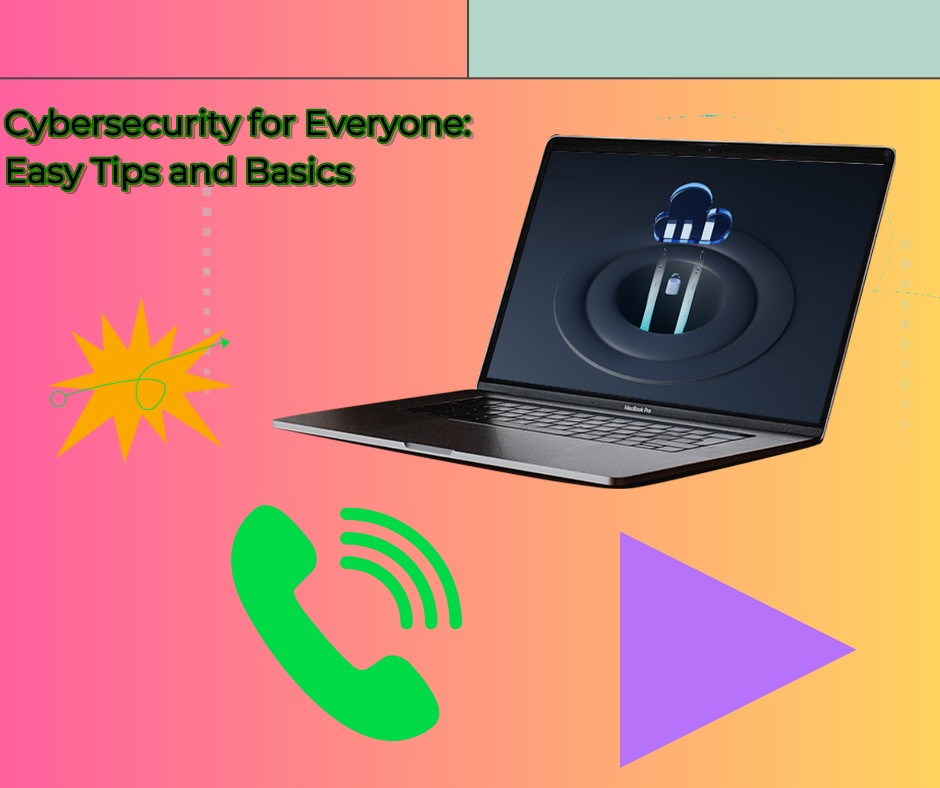Introduction
These days, we use the internet for almost everything—shopping, banking, socializing, and working. But being online also comes with risks. Cybersecurity is about protecting your online information from being stolen or misused. This article will help you understand cybersecurity basics and give you easy tips to stay safe online.
What is Cybersecurity?
Cybersecurity protects your computers, smartphones, and other devices from hackers and bad software (malware). It involves using passwords, antivirus programs, and other tools to keep your information safe.
Why is Cybersecurity Important?
- Protecting Personal Information: Hackers want your personal details like social security numbers, credit card info, and private messages.
- Secure Financial Transactions: Online banking and shopping need to be safe from fraud and theft.
- Business Safety: Companies need cybersecurity to prevent financial loss and protect their reputation.
- National Safety: Critical services like power and water need secure networks to function properly.
Common Cyber Threats
- Malware: Bad software like viruses that can damage your computer.
- Phishing: Fake emails or messages trying to steal your information.
- Ransomware: A type of malware that locks your data until you pay money.
- Denial of Service (DoS) Attacks: Attacks that shut down websites or services.
- Man-in-the-Middle (MitM) Attacks: Hackers intercept your communications to steal data.
Easy Cybersecurity Tips for Everyone
- Use Strong Passwords: Make passwords hard to guess by using a mix of letters, numbers, and symbols. Don’t use the same password everywhere.
- Enable Two-Factor Authentication (2FA): This adds an extra step to log in, like a text message code.
- Keep Software Updated: Regular updates fix security problems in your apps and systems.
- Install Antivirus Software: Protect your devices from malware with a good antivirus program.
- Beware of Phishing: Don’t click on links or open attachments from unknown senders.
Cybersecurity for Small Businesses
Small businesses need to be cautious too. Here’s how they can improve their cybersecurity:
- Train Employees: Teach staff about security risks and how to avoid them.
- Encrypt Data: Make sure your data is encrypted so only authorized people can read it.
- Secure Your Network: Use firewalls and virtual private networks (VPNs) to protect your network.
- Regular Backups: Back up important data regularly to recover it if something goes wrong.
- Incident Response Plan: Have a plan ready to deal with security breaches.
Advanced Cybersecurity for Big Companies
Large companies face more complex threats and need stronger protections:
- Follow Cybersecurity Frameworks: Use standards like NIST or ISO to guide security efforts.
- Set Up a Security Operations Center (SOC): Monitor and respond to security incidents in real-time.
- Use Threat Intelligence: Stay updated on new threats and vulnerabilities.
- Conduct Penetration Testing: Regularly test your systems for weaknesses.
- Adopt Zero Trust Security: Never automatically trust devices or users, always verify them.
Role of Governments and Laws
Governments create laws to help protect data and ensure cybersecurity. Some important ones include:
- General Data Protection Regulation (GDPR): Protects personal data in the EU.
- Health Insurance Portability and Accountability Act (HIPAA): Safeguards medical information in the US.
- California Consumer Privacy Act (CCPA): Enhances privacy for California residents.
- Cybersecurity Information Sharing Act (CISA): Promotes sharing of cyber threat info in the US.
New Trends in Cybersecurity
- Artificial Intelligence (AI): AI helps detect and respond to cyber threats faster.
- Internet of Things (IoT) Security: More devices mean more security needs.
- Quantum Computing: Future computers may need new ways to secure data.
- Blockchain Security: Blockchain tech can improve security and transparency.
Personal Responsibility in Cybersecurity
Everyone can help make the internet safer. Here are some simple habits to adopt:
- Stay Informed: Keep up with the latest security news.
- Think Before You Click: Be careful with links and emails from unknown sources.
- Secure Your Devices: Use passwords and biometric locks.
- Practice Good Cyber Hygiene: Regularly update passwords and software, and back up data.
Conclusion
Cybersecurity is important for everyone. By understanding the basics and following simple tips, you can protect yourself online. Whether you’re keeping your personal info safe, protecting your business, or following the law, staying informed and vigilant is the key to staying safe from cyber threats.
In conclusion, cybersecurity is for everyone. By taking proactive steps to secure our digital lives, we can protect ourselves and our communities from the growing threat of cybercrime.

